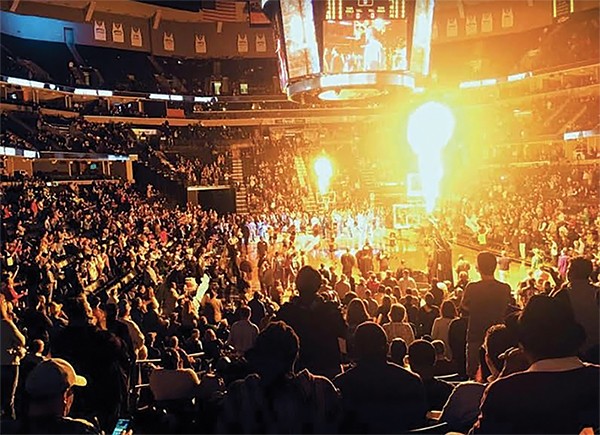This time of year, when the sun leaves the sky before 5 p.m., Memphis Grizzlies games are among the few things that get me motivated to do anything in the evenings. One recent dark, cold evening, I got home feeling glum, until I remembered the Grizzlies were playing. Making a beeline toward the TV, I was hit with a wave of excitement.
A few minutes later, my dad moseyed in and made his way to the couch. Not long after, my sister woke up from a nap (a rare miracle) and joined us. In that moment, watching the Griz dominate whatever doomed opponent they were playing that night, my endorphins were flowing, and I forgot all about the ubiquitous darkness outside. The Griz made that gloomy night into a mildly glorious one with my family.
 Maya Smith
Maya Smith
Standing up at a Griz game
The same is true when you’re in the FedExForum or at a bar watching the game or just strolling down Beale Street getting score updates from strangers. You can feel the unified energy.
The Grizzlies bring people together. People that don’t look like each other, representing different neighborhoods of the city, are united by a common goal: grit and grind.
When the Griz win, the city is winning. But the next day or during a slump or the off-season, that excitement is gone. It’s tossed aside and forgotten. That unity subsides. And what’s left? A sometimes divided city.
How can we carry that unified spirit beyond the FedExForum and into everyday life? One way is good public spaces.
I recently visited Denver, where nice public spaces are as common as sidewalks. There were chess games set up on pedestrian plazas, a mini golf course tucked in the middle of downtown, and art in nearly every park I came across.
The infrastructure there sparks connectivity and community. How can Memphis be designed in such a way that it promotes and brings communities together?
The city is definitely making strides to improve shared public spaces. Just look at what’s happening on our the riverfront (see the Flyer‘s November 15th cover story for details). But, we can’t stop only at the city’s hot spots and tourist hubs, because a chain is only as strong as its weakest link. That means the city of Memphis is only as great as its struggling neighborhoods.
Have you ever noticed the amount of people that loiter at corner stores and gas stations in poorer neighborhoods? Ever wonder why that is? Well, when your neighborhood parks are rife with knee-high weeds and littered with trash, there are few places left for people to just be people together. Uplifting those neighborhoods starts at the top.
A few months ago, I sat down with Paul Young, director of the city’s Housing and Community Development division to talk about his role there. Young told me HCD works hard to equally elevate and support small-scale neighborhood projects as it does larger projects designed to bring in revenue. That sentiment is a good step in the right direction.
On Monday, the state reviewed the city’s Tourist Development Zone application that would help finance the $100 million Fairgrounds project. If approved, I hope that when it’s completed, the space is inclusive and that those living literally across the street are able to benefit from it. They deserve access to clean, free, quality spaces with public amenities.
The development’s flagship feature — the youth sportsplex and event center — is fine in theory and will probably bring in lots of revenue, but at the end of the day, what good does it do to accommodate tourists if we do it at the expense of — or exclude — the families who for generations have lived and worked in the community? We need to make sure they are included.
I truly believe that Memphis can be great. It has the potential to be a progressive city that’s rich with culture and blooming with diversity and that, most importantly, empowers all of its residents.
Memphis is nearing its 200th year as a city. That’s 200 years of history, movements, and progress. It’s been a long time coming, but this city is moving in the right direction. Still, there’s more work to be done. If you call yourself a Memphian, then stand up for this city and all of the people in it.
Stand up for the poorest neighborhoods, housing parks with broken-down playgrounds, schools in need of modernization, and busted, unwalkable sidewalks. Stand up and make Memphis — all of Memphis — great.
Maya Smith is a Flyer staff writer.